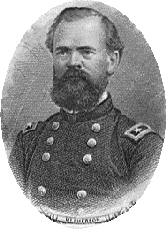James B. McPherson
|
|
James Birdseye McPherson (November 14, 1828 – July 22, 1864) was a general who fought in the Union Army during the American Civil War. He was killed at the Battle of Atlanta.
Born near Clyde, Ohio, he graduated from West Point in 1853, top in his class, which included John Bell Hood, who would oppose him later in the West. At the start of the Civil War, he was stationed in San Francisco, California, but requested a transfer to the Corps of Engineers, rightly thinking that a transfer to the East would further his career. He departed California on August 1, 1861, and arrived soon after in New York. He requested Major General Henry W. Halleck, one of the senior Western commanders (Western meaning east of the Mississippi River, west of approximately the Appalachian Mountains) for a position on his staff. He received this (while a captain in the Corps of Engineers), and was sent to St. Louis, Missouri.
McPherson's career began rising after this assignment. He was the Chief of Engineers (after being promoted to lieutenant colonel) under Brigadier General Ulysses S. Grant's army during the takeover of Fort Henry and Fort Donelson. Following the Battle of Shiloh, he was promoted to brigadier general. On October 8, 1862, he was promoted to major general, and given command of the XVII Corps (under the Army of the Tennessee) soon after. On March 12, 1864, he was given command of the Army of the Tennessee, after its former commander, Major General William T. Sherman, was promoted to command of all Armies in the West (after Grant was sent to the East). His army was the Right Wing, along with the Army of the Cumberland and the Army of the Ohio consisting the rest of the Union force. On May 5, 1864, Sherman began his march toward Atlanta.
Sherman planned to have the bulk of his forces feint toward Dalton, Georgia, while McPherson would bear the brunt of Confederate General Joseph E. Johnston's attack, and attempt to trap them. However, the Confederate forces eventually escaped, and Sherman blamed McPherson (for being "slow"), although it was mainly faulty planning on Sherman's part that led to the escape. McPherson's troops followed the Confederates "vigorously", and was resupplied (after running out) at Kingston, Georgia. The troops drew near Pumpkinvine Creek, where they formed and attacked the Confederates (and drove them out) at Dallas, Georgia, even before Sherman's order to do so. Johnston and Sherman maneuvered against each other, until the Union disaster at the Battle of Kennesaw Mountain. McPherson then tried a flanking maneuver at the Battle of Marietta, but that failed as well.
However, on July 17, President Jefferson Davis removed Johnston (who had been doing rather decently against the Union armies), and placed General John Bell Hood in his place. Hood was eventually defeated, and retreated into Atlanta. Meanwhile, McPherson had advanced his troops into Decatur, Georgia, and from there, they moved onto the high ground on Bald Hill overlooking Atlanta. They noticed that the Confederate troops had left Atlanta. Sherman believed that the Confederates had been defeated and left Atlanta; however, McPherson rightly believed that they were moving to attack the Union right and rear. While they were discussing this new development, though, four divisions under Lieutenant General William Hardee flanked Major General Grenville Dodge's XVI Corps. However, while riding his horse toward his old XVII Corps, a line of Confederate skirmishers appeared, yelled "Halt!". McPherson raised his hand to his head as if to remove his hat, but suddenly wheeled his horse, presumably to attempt escape. The Confederates opened fire and mortally wounded McPherson.
His adversary, John Bell Hood, wrote, "the death of my classmate and boyhood friend, General James B. McPherson, [has] caused me sincere sorrow." McPherson was well-loved by his troops, and his presence was sorely missed in the Western theatre of operations.
Sources
- Northern Georgia - James B. McPherson (http://ngeorgia.com/people/mcpherson.html)
- James McPherson Biography (http://www.spartacus.schoolnet.co.uk/USACWmcpherson.htm)

